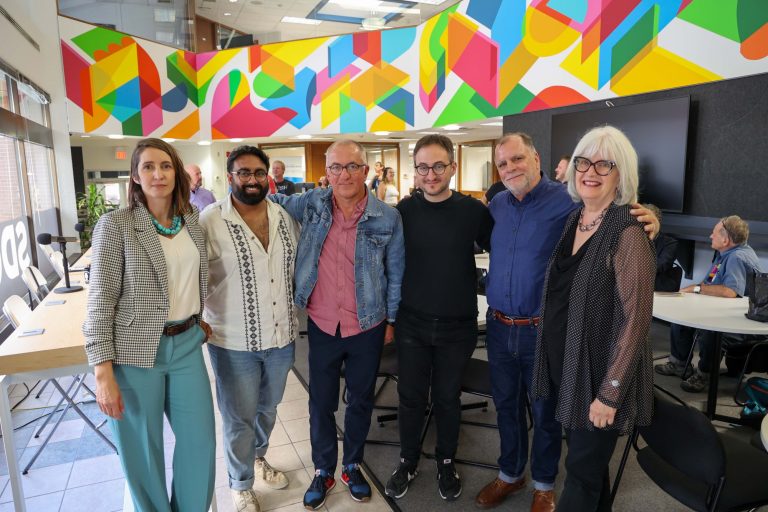Can music save a city? That’s what Shain Shapiro, author of This Must Be the Place: How Music Can Make Your City Better (Repeater Books, 2023) wants us to consider.
Shapiro, a leading music and cultural policy thinker, stopped in Kitchener at the SDG Idea Factory on October 6 to chat with local councillors, musicians, venue operators and music supporters as part of a Midtown Radio-sponsored discussion about music cities.
“Most of the communities that we live in are not investing in music and not understanding music in the same way that we invest in other forms of critical infrastructure,” Shapiro said.
With the loss of many live music venues because of the COVID-19 pandemic and the recent bankruptcy of the KW Symphony, this community knows well the challenges of a struggling music ecosystem.
Shapiro emphasizes that music is impacted by planning and policies that often have nothing to do with music—such as zoning, liquor licensing, and noise bylaws—but that have a huge impact on how, when and where people can experience live music.
This insight came from years working as a consultant helping cities build stronger music ecosystems. Shapiro grew to realize that the solutions to the music industry’s biggest problems were often not music solutions at all.
“They were planning solutions, health care solutions, education solutions,” Shapiro said.
Amit Mehta, founder and director of Good Company Productions, sees this first-hand in his work with local artists.
“A lot of the artists that I’m working with can’t afford to live here anymore. So, why would they have energy to create music if right now their main priority is just figuring out how to stay in the community?” Mehta said.
The difficulties of regulating and supporting music in our communities are further exacerbated by the complexity of our two-tier governance model, with artists and arts organizations seeking funding across multiple municipalities. Shapiro notes that having a regional-level strategy for arts and culture could help strengthen the overall ecosystem.
“There are loads of solutions. Combined authorities exist in many parts of the world. Certain sectors can be responsible both at a combined authority level and a local authority level. Culture can be one of them,” Shapiro said.
Without a regional arts council to lead research and advocacy, the art and culture sectors are working in the dark. Currently, the region does not have a large-scale, high-level data capture of the music sector, or any other cultural sector in our region.
“The most important thing and the thing that I’m hoping that you can take away from this is, if you want to take music seriously, you have to take music seriously. That means you need to build the data and evidence base around it, so we can start to make evidence-based policy-making rather than policy-based evidence-making,” Shapiro said.
The need for better data was echoed by panel participant Betty Anne Keller, long-time music promoter and retired municipal employee with the City of Waterloo.
“What I would hope is that this takes us collectively to an audit for the whole music picture in our community. There are all these secrets—the back door behind Darlise Café, there’s this little club, Sugar Run. Which is part of the story, but nobody knows except a certain slice of the demographic. The audit will give us a picture of what we stand to lose or what we have now,” Keller said.
For Paul Kalbfleisch, co-author of The JOY Experiments: Starting a New Conversation on City Building, how we value the music ecosystem needs to go beyond mere data points.
“I think it is a much more interesting thing, requiring more thoughtful measurements, because supporting the process means supporting people nurturing each other, supporting people working together, supporting a web of activity that has an amazing way of sort of seeping out into the community and making the community more joyful, more human,” Kalbfleisch said.
“This is an industry that grew by 7.8 per cent last year globally. What another sector grew 7.8 per cent? It grew at the same level as PPE during [COVID-19]. So, this is a good time to invest in music. It’s a great opportunity to really consider music as a form of sustainable economic development,” Shapiro said.
It’s a narrative that local politicians also appear willing to get behind. Kitchener Mayor Berry Vrbanovic made an appearance at the event.
“We’ve made it a priority as a city to be investing more in the music scene. We’ve created a new division at the city that’s actually going to be focused on our music venues and growing the whole live entertainment scene, and really helping put the city on the map in the future,” Vrbanovic said.
For music promoters like Mehta, there is a lot of room to grow in terms of having not just venues, but also all kinds of other professional support services for musicians who create a necessary infrastructure.
“There are so many skill sets required to get music out there that people do not think about, and you cannot expect a musician to do it all on their own,” Mehta said.
Whatever the solutions, Shapiro reminds us that the stakes are high.
“Music is our universal language. It’s the language that we all learn to speak first. We learn it in the womb and, I always say, it’s something that we may not need to live, but we would all struggle to live without,” Shapiro said.

